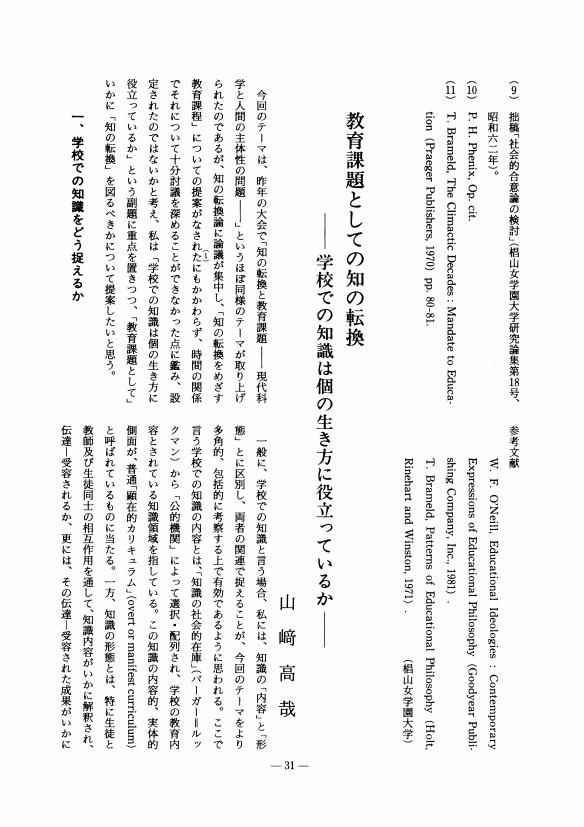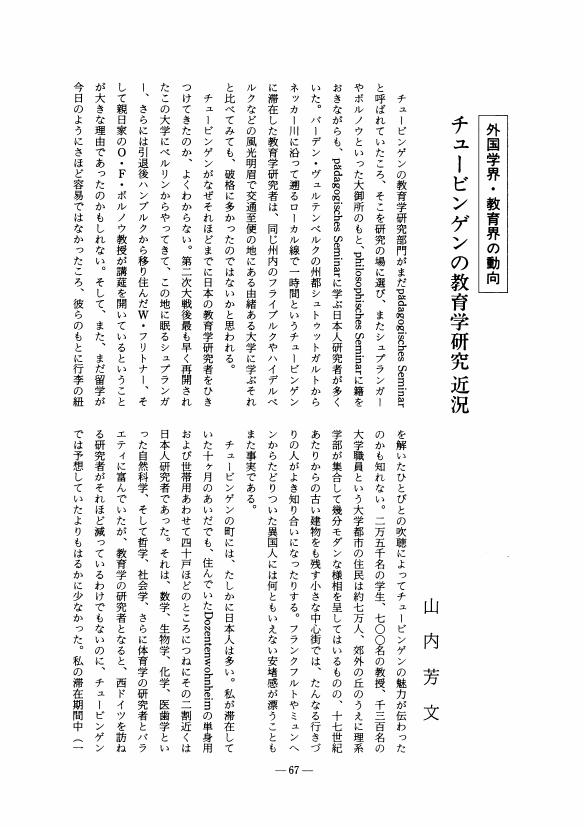1 0 0 0 OA デューイ教育学における「信仰」の位置 「成長」としての教育目的論を中心に
- 著者
- 山室 吉孝
- 出版者
- 教育哲学会
- 雑誌
- 教育哲学研究 (ISSN:03873153)
- 巻号頁・発行日
- vol.1991, no.63, pp.66-79, 1991-05-10 (Released:2009-09-04)
- 参考文献数
- 52
The 'faith' which is proclaimed in “A Common Faith” and interpreted as Dewey's religious thought deviates from the traditional Christian faith. However, deviating as it seems to be, there is a similarity in the attitude of relying on something which cannot be grasped intellectually or by experience. But his religious thought, as also his educational thought, can be traced to his philosophy. Hence, originally, the content of his 'religious thought' and his educational thought should be identical at the root. Yet, until now, the problem was never raised which position the 'faith' he proclaimed occupies in terms of his educational thought. I clarify here the position his 'faith', believed to originate from the influence of Christianity while at the same time deviating from it, occupies within his educational thought.
1 0 0 0 OA 音楽教育における身体観の再検討 環境音楽と「音の教育」を手がかりにして
- 著者
- 中井 孝章
- 出版者
- 教育哲学会
- 雑誌
- 教育哲学研究 (ISSN:03873153)
- 巻号頁・発行日
- vol.1991, no.63, pp.80-93, 1991-05-10 (Released:2009-09-04)
- 参考文献数
- 42
- 被引用文献数
- 1
This paper grapples with the problem of how two contradictory trends, i.e. sound education and training by 'correct' listening through the school subject of music on the one hand, and the training of bodily and time-sense discipline through noise such as chimes on the other hand, can exist side by side; it is attempted to develop a reform of the repression of body feeling resulting from this problem by searching for a feature sound scenery of the child and its systematization through environmental music.Looking at it from the angle of listening, the way of listening as music appreciation ressembling the setting of a concert hall, is repressive as it is limited to the activation of only some particular organ (hearing) of the body whereas a sound scenery created by music performed by children in a life-like setting, symbolized as 'the mystery of sound' creates every time with acuteness in the body sensation a feature of sound. The systematic grasp of the feature world of sound admitting unlimited possibilities for change, constitutes environmental music and forms the prototype of music. It turns the listener to exploratory listening by its characteristic feature of forming non-dailiness (the effect of 'dissimilation') enabling him to re-appraise anew radically the accustomed life environment. Constructing 'sound education' based on environmental music also in music practice, and revealing contradictory sound education and training is being demanded.
1 0 0 0 OA カウンツ教育思想におけるデモクラシーと教化との関係
- 著者
- 田中 智志
- 出版者
- 教育哲学会
- 雑誌
- 教育哲学研究 (ISSN:03873153)
- 巻号頁・発行日
- vol.1991, no.63, pp.94-106, 1991-05-10 (Released:2010-01-22)
- 参考文献数
- 30
The purpose of this paper is to give an at least somewhat satisfactory answer to the question why Counts linked indoctrination with democracy. In order to understand the relation of these two concepts, I interpret it not from the premises of Marxism-Leninism but, in accordance with the two following moments, from his theory of social reconstruction. One moment if the historical relativism implied in the historical concurrence theory of his friend Villard; the second is the moral 'faith' which is consonant with 'American culture', or 'American civilization conform to Villard's conceptions.As a result, the following conclusions are drawn : 1) Counts' democracy is neither a form of a narrow political system nor a doctrine for constructing a closed world. Basically, it implies moral faith concomitant to social relations in a typically American agricultural society. 2) This democracy is neither something which the child can weigh and choose nor a substantialized value nor something which can be taught as a political doctrine; it is essentially the outcome of a subconscious compulsory act (coercion) of the American= democratic social order. 3) However, at a time when the democratic social system and the faith embodying American culture are blocked, the school must increasingly strengthen the compulsory action (i.e. indoctrination) in order to save democracy. 4) Finally, Villard's historical relativism was chosen by the sociologist Counts as his own standpoint (normative proposition) and serves as a politico-philosophical enhancement of his theoretical moment; including some degree of conjecture, I may say his American 'faith' as such becomes the existential moment so to speak for overcoming a crisis.
1 0 0 0 OA ペスタロッチー人間学の精神分析的解釈の試み
- 著者
- 寺岡 聖豪
- 出版者
- 教育哲学会
- 雑誌
- 教育哲学研究 (ISSN:03873153)
- 巻号頁・発行日
- vol.1991, no.64, pp.1-14, 1991-11-11 (Released:2010-05-07)
- 参考文献数
- 44
In Pestalozzi's Research, the “Nachforschungen” were treated by E.. Spranger and many other scholars, and the meaning of its anthropology was investigated. As a result, common understanding was reached that in the “Nachforschungen” the idea of a moral autonomy or independencne (Selbatändigkeit) appears which cannot be found in earlier writings.This paper, on the other hand, proposes as a new viewpoint a psycho-analytical interpretation. We re-examine the meaning of Pestalozzi's anthropology by considering first the unavoidable 'distortion' (Verstümmelung) of the human being, i. e. of the nature of man in the social situation. As a result, the maning of Pestalozzi's anthropology was discovered in the method designed as an aid to the human formation of the people. When Pestalozzi was facing the pathological situation of the distortion of the people, the method was proposed because its remedial function was badly needed. Hence, from the text of the “Nachforschungen” it is possible to discover Pestalozzi as a clinical worker, diagnozing pathological symptoms.
1 0 0 0 OA フリードリヒ・フレーベルの幼稚園創立にかかわる「直筆書簡」
- 著者
- 小笠原 道雄
- 出版者
- 教育哲学会
- 雑誌
- 教育哲学研究 (ISSN:03873153)
- 巻号頁・発行日
- vol.1991, no.63, pp.109-111, 1991-05-10 (Released:2009-09-04)
1 0 0 0 OA 教育哲学を考える
- 著者
- 西村 皓
- 出版者
- 教育哲学会
- 雑誌
- 教育哲学研究 (ISSN:03873153)
- 巻号頁・発行日
- vol.1991, no.63, pp.107-108, 1991-05-10 (Released:2009-09-04)
1 0 0 0 OA 合理主義と非合理主義の二項対立を超えて 遊びの論理学と近代合理主義
- 著者
- 矢野 智司
- 出版者
- 教育哲学会
- 雑誌
- 教育哲学研究 (ISSN:03873153)
- 巻号頁・発行日
- vol.1991, no.63, pp.10-15, 1991-05-10 (Released:2009-09-04)
- 参考文献数
- 3
1 0 0 0 OA 研究討議に関する総括的報告
- 著者
- 神保 博行 原 聡介
- 出版者
- 教育哲学会
- 雑誌
- 教育哲学研究 (ISSN:03873153)
- 巻号頁・発行日
- vol.1991, no.63, pp.15-19, 1991-05-10 (Released:2009-09-04)
- 著者
- 相良 敦子
- 出版者
- 教育哲学会
- 雑誌
- 教育哲学研究 (ISSN:03873153)
- 巻号頁・発行日
- vol.1991, no.63, pp.20-25, 1991-05-10 (Released:2010-01-22)
- 参考文献数
- 16
1 0 0 0 OA 教育課題としての知の転換 学校での知識は個の生き方に役立っているか
- 著者
- 甲斐 進一
- 出版者
- 教育哲学会
- 雑誌
- 教育哲学研究 (ISSN:03873153)
- 巻号頁・発行日
- vol.1991, no.63, pp.26-31, 1991-05-10 (Released:2009-09-04)
- 参考文献数
- 13
1 0 0 0 OA 教育課題としての知の転換 学校での知識は個の生き方に役立っているか
- 著者
- 山崎 高哉
- 出版者
- 教育哲学会
- 雑誌
- 教育哲学研究 (ISSN:03873153)
- 巻号頁・発行日
- vol.1991, no.63, pp.31-36, 1991-05-10 (Released:2009-09-04)
- 参考文献数
- 12
1 0 0 0 OA 課題研究に関する総括的報告
- 著者
- 毛利陽 太郎
- 出版者
- 教育哲学会
- 雑誌
- 教育哲学研究 (ISSN:03873153)
- 巻号頁・発行日
- vol.1991, no.63, pp.36-41, 1991-05-10 (Released:2009-09-04)
- 著者
- 野平 慎二
- 出版者
- 教育哲学会
- 雑誌
- 教育哲学研究 (ISSN:03873153)
- 巻号頁・発行日
- vol.1991, no.63, pp.54-65, 1991-05-10 (Released:2010-05-07)
- 参考文献数
- 25
The modern world, emerging by a process of rationalization which is characterised as the 'delivery from magic through reason', emphasizes the turn from blind obedience to authority to the autonomy of the subject. In that sense, the modern world can be described as an 'educational project'. But today, because of its inherent ambivalence, the modern world, rather than being looked upon in a positive way, frequently becomes the object of a critical evaluation and pointing to the loss of the meaning of life and the loss of liberty, education centered on reason seems to be no longer possible.Contrary to this, there is the German philosopher J. Habermas, as one of those theorists who on the basis of a philosophy of 'linguistic turn' reexamine the concept of reason from the viewpoint of 'communicative reason' and thus foster the idea of an enlightened modern world. This paper tries to understand Habermas' philosophical accomplishments as a questioning of the basic background of a modern pedagogy; it attempts a new approach of an enlightened Consciousness based on the concept of 'communicative reason' and of educational thought.
1 0 0 0 OA 垣内松三における国語教育科学の構想
- 著者
- 戸田 功
- 出版者
- 教育哲学会
- 雑誌
- 教育哲学研究 (ISSN:03873153)
- 巻号頁・発行日
- vol.1991, no.63, pp.42-53, 1991-05-10 (Released:2009-09-04)
- 参考文献数
- 23
This paper aims at clarifying the conception of Matsumi Kaitô to construct a theory of language education.Constructing a theory of language education was the aim and the end of his studies in language education. He turned his attention to the reality of language education and treated it from a methodological viewpoint in order to construct a systematic theory of the science of language education. The viewpoint of the reality of language education forms an essential element in Kaitô's theory. He arranged all theories of language education into two types, theories based on the reality of language education and normative theories of language education.Kaitô's conception aims at reexamining the methods of studying language education by applying two methodological viewpoints. The viewpoint of the reality of language education is constructed in cnnection with these two categories of viewpoints, on the one hand the viewpoint of relation, on the other hand the viewpoint of culture which looks at reality in the light of culture.The construction of Kaitô's conception is guided by the following views on the reality of language education : First, the problem is stated from the viewpoint of the reality of language education; secondly the fields of study are determined by stating the problems. Each field corresponds to one volume of Kaitô's “Independent Lectures.” Examining these we discovered two mistakes : (1) The viewpoint is not sufficiently applied; (2) Kaitô regards the reality of language classes as the reality of language education. Because of these mistakes, the construction of Kaitô's conception contradicts his original aim. However, Kaitô's conception is still valuable in the sense that it takes the reality of language education as a viewpoint. Yet, we should reexamine the viewpoint and the methods of studying language education and try to construct a new systematic theory of language education.
1 0 0 0 OA 道徳教育の原理的考察 ルソー・カントの思想にたちかえって
- 著者
- 横山 れい子
- 出版者
- 教育哲学会
- 雑誌
- 教育哲学研究 (ISSN:03873153)
- 巻号頁・発行日
- vol.1990, no.62, pp.61-66, 1990-11-10 (Released:2009-09-04)
- 参考文献数
- 8
1 0 0 0 OA チュービンゲンの教育学研究近況
- 著者
- 山内 芳文
- 出版者
- 教育哲学会
- 雑誌
- 教育哲学研究 (ISSN:03873153)
- 巻号頁・発行日
- vol.1990, no.62, pp.67-71, 1990-11-10 (Released:2009-09-04)
1 0 0 0 OA 西ドイツ・ケルン滞在報告 (一九八二年から一九八九年)
- 著者
- 鈴木 晶子
- 出版者
- 教育哲学会
- 雑誌
- 教育哲学研究 (ISSN:03873153)
- 巻号頁・発行日
- vol.1990, no.62, pp.72-77, 1990-11-10 (Released:2009-09-04)
1 0 0 0 OA 増渕幸男著『ヤスパースの教育哲学研究』
- 著者
- 田代 尚弘
- 出版者
- 教育哲学会
- 雑誌
- 教育哲学研究 (ISSN:03873153)
- 巻号頁・発行日
- vol.1990, no.62, pp.78-82, 1990-11-10 (Released:2009-09-04)
- 著者
- 鈴木 美南子
- 出版者
- 教育哲学会
- 雑誌
- 教育哲学研究 (ISSN:03873153)
- 巻号頁・発行日
- vol.1990, no.62, pp.83-87, 1990-11-10 (Released:2009-09-04)
1 0 0 0 OA 教育における合理主義と非合理主義 「近代学校」と合理主義
- 著者
- 俵木 浩太郎
- 出版者
- 教育哲学会
- 雑誌
- 教育哲学研究 (ISSN:03873153)
- 巻号頁・発行日
- vol.1991, no.63, pp.1-4, 1991-05-10 (Released:2009-09-04)













